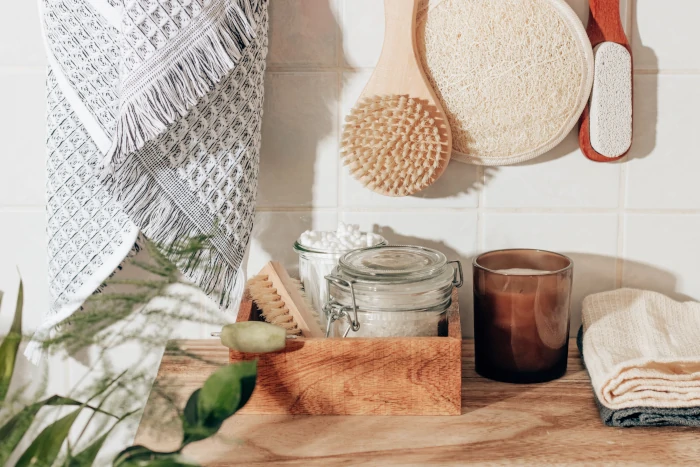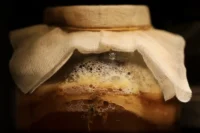
Going Outdoors During Winter – Here’s What You Need
Going Outdoors During Winter offers a unique and invigorating experience, allowing you to enjoy the serene beauty of snow-covered landscapes and the crisp, fresh air.

In a world increasingly aware of the environmental impact of our daily choices, the kitchen serves as a focal point for implementing sustainable practices. Embracing eco-friendly alternatives not only reduces waste but also promotes a healthier planet. From reusable containers to mindful shopping, there are numerous ways to adopt sustainable living in the heart of your home. One often overlooked yet incredibly versatile and eco-conscious tool in the kitchen is cheese cloth.
While commonly known for its role in food preparation, cheese cloth transcends its typical uses, proving to be a sustainable ally in various aspects of the culinary world. Made from cotton or other natural fibers, this unassuming, fine-mesh material is not only durable but also reusable, making it an eco-friendly option for a range of kitchen activities.
1. Straining and Filtering: One of the primary uses of cheese cloth is in straining liquids. Whether you’re making homemade cheese, filtering broth, or squeezing the juice from fruits for jellies or preserves, cheese cloth’s fine weave captures impurities while allowing liquids to pass through, resulting in clearer, cleaner outcomes.
2. Reusable Produce Bags: Embrace sustainability by using cheese cloth as an alternative to single-use produce bags. It’s excellent for storing fruits and vegetables, keeping them fresh while reducing the need for disposable plastics.
3. Covering Ferments: When fermenting foods like kombucha, yogurt, or sourdough, cheese cloth acts as a breathable cover, allowing gases to escape while protecting the ferment from contaminants.
4. Crafting Eco-friendly Wraps: Reduce plastic waste by crafting your own beeswax wraps using cheese cloth. Coat it with beeswax and jojoba oil for a reusable and compostable alternative to plastic wrap.
The integration of cheese cloth into daily kitchen routines symbolizes a larger commitment to sustainable living. However, the kitchen offers a myriad of other opportunities to reduce waste and promote eco-friendliness:
Opting for reusable containers is a pivotal step in reducing kitchen waste. Choosing containers made of glass, stainless steel, or BPA-free plastics promotes sustainability in several ways: These containers are more durable than single-use plastics and can be reused numerous times. Glass and stainless steel containers, for instance, can withstand heat, making them suitable for reheating food, and they don’t deteriorate over time as plastics might. By using reusable containers for food storage, you cut down on the need for disposable plastic bags, cling wraps, and other one-time-use packaging materials. This significantly lessens the amount of plastic waste ending up in landfills.
Composting is an eco-friendly way to manage kitchen waste and transform it into nutrient-rich soil for gardening. It involves collecting food scraps, such as vegetable peelings, fruit cores, coffee grounds, and eggshells, and allowing them to decompose into compost. This practice offers several benefits: Food waste is a major component of landfills and contributes to methane emissions. Composting diverts this waste from landfills, reducing greenhouse gas emissions. Additionally, compost can be used as a natural fertilizer for plants and gardens, improving soil structure, retaining moisture, and providing essential nutrients, thereby reducing the need for chemical fertilizers.
Mindful Shopping
Mindful shopping entails making thoughtful choices when purchasing food and kitchen supplies, considering their environmental impact. Buying locally grown and in-season produce reduces the carbon footprint associated with transportation, supporting local farmers and helping sustain the local economy. Additionally, purchasing items in bulk or opting for package-free options minimizes packaging waste, promoting sustainability. Bringing your own reusable bags or containers to fill with bulk items further reduces the use of disposable packaging materials.
Energy-Efficient Appliances:
Using energy-efficient appliances significantly reduces energy consumption and the environmental impact. Energy-efficient appliances, including refrigerators, dishwashers, and stoves, are designed to use less energy, resulting in reduced electricity bills and lower greenhouse gas emissions. Specifically, appliances with the Energy Star label meet energy-efficiency guidelines and often use advanced technology to conserve energy without sacrificing performance, ensuring a more environmentally friendly and cost-effective option for households.
Sustainable living in the kitchen involves a series of conscious choices that collectively make a significant impact on the environment. Integrating cheese cloth into various culinary activities represents a small yet powerful step toward reducing waste and embracing reusable, eco-friendly alternatives. By choosing such tools and implementing sustainable practices, we pave the way for a healthier planet and a brighter future.
In essence, the humble cheese cloth, with its multiple applications and reusability, stands as a symbol of a larger movement toward a more sustainable, eco-conscious lifestyle within our kitchens and beyond.

Going Outdoors During Winter offers a unique and invigorating experience, allowing you to enjoy the serene beauty of snow-covered landscapes and the crisp, fresh air.

In the world of food preservation, Mylar bags have become increasingly popular due to their durability and ability to protect food from environmental factors. While

Fermentation, an ancient method of food preservation and flavor enhancement, has experienced a resurgence in popularity in recent years. From tangy sauerkraut to fizzy kombucha,